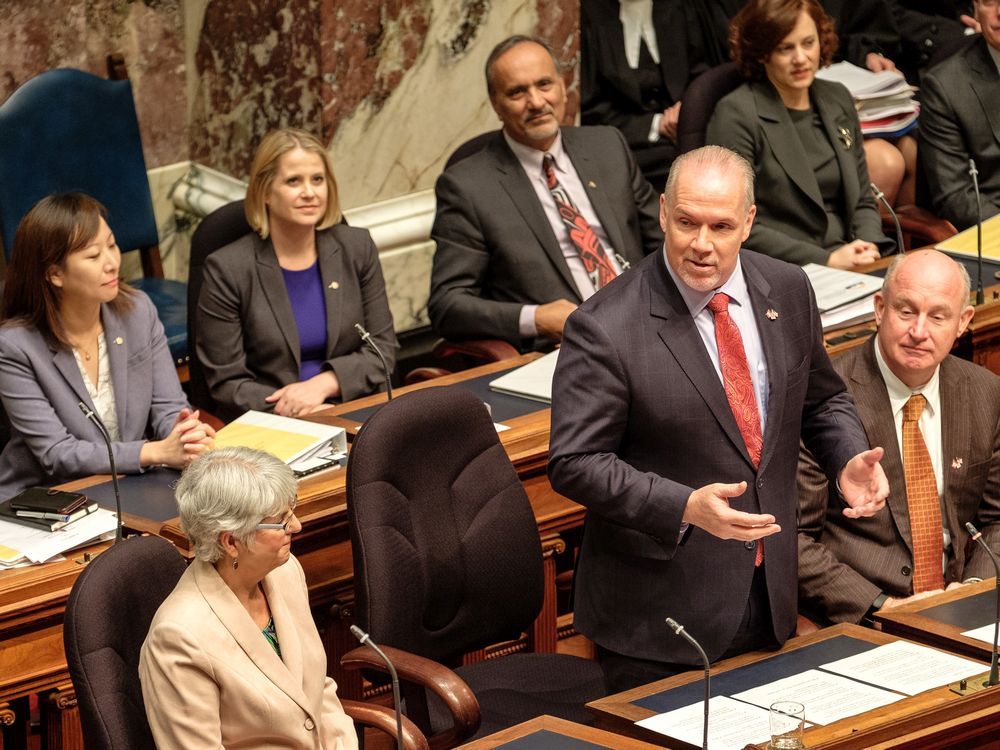Vaughn Palmer: Project overruns, not protests, might shake B.C. NDP faith in community benefits agreements

Credit to Author: Stephen Snelgrove| Date: Wed, 20 Nov 2019 01:11:52 +0000
VICTORIA — When the legislature convened Tuesday morning, the public galleries were packed with construction workers, come to protest the NDP’s preference for certain unions on some transportation projects.
Playing to that gallery was B.C. Liberal Leader Andrew Wilkinson, who started off question period with a quote attributed to John Horgan back in 2016.
“We’re going to do it with union labour,” said the then Opposition leader, addressing a convention of the operating engineers. “You don’t do it by going with the turkeys at CLAC. That’s not how I roll. That’s not how we roll.”
The “it” being work on publicly funded construction projects. “CLAC” being a construction union not aligned with the NDP, and one of the organizers of Tuesday’s protest.
As for the disparaging reference to CLAC members as “turkeys,” the B.C. Liberals riffed on that theme throughout question period, demanding the premier stand up and apologize for what he’d said back in his Opposition days.
Nearing the end of question period, Horgan did stand up and, what’s more, he looked up at the folks in the gallery and addressed them directly.
“I want to first say thank you for your service for the people of British Columbia. Thank you for your work in building a better B.C. All British Columbians, whether they’re members of the operating engineers or CLAC, deserve the respect of their government.”
Then, by way of explanation, Horgan added: “The reference to turkeys was to Mr. Phil Hochstein, who was appointed by that government” — meaning the B.C. Liberals — “to head the Turkey Marketing Board. That was where the concept came from.”
Hochstein was then head of the Independent Contractors and Businesses Association and a longtime bête noire of the New Democrats.
The Liberals did indeed put him on the turkey marketing board, which generated a joke or two about Hochstein having demonstrated his qualifications by helping market the Liberals to the voters.
With that out of the way, Horgan then defended the NDP preference for so-called “community benefits agreements” on some publicly funded transportation projects.
The agreements impose a number of conditions in terms of hiring, training and benefits. Though union and non-union companies are free to bid on such projects, the workforce is compelled within 30 days to join one of 19 preferred unions, all aligned with the NDP.
Horgan maintains the concept has its roots in project-wide labour agreements used by the W.A.C. Bennett Social Credit government on major B.C. Hydro projects in the 1960s. The New Democrats also released a list of projects initiated by Hydro on a similar basis under the Liberals.
“We on this side of the house believe we need to build the next generation of workers,” argued the premier. “The way to do that is through community benefits agreements.
“We campaigned on community benefits agreements,” added Horgan, referring to a commitment he made several times before the last provincial election.
“You will be at the table with me,” he’d told the unionized building trades in an address to their convention in the spring of 2016. “We will build B.C., we will build roads, we will build transit and we will do it with you and your members. … I am not bullshitting you today.”
True to the vow, Horgan announced in early 2018 that the first of the community benefits agreements would be applied to the budgeted-at-$1.4 billion replacement of the Pattullo Bridge.
But for all the New Democrat’s insistence that community benefits agreements, or CBAs, are the coming thing —for hiring women, minorities and training the next generation of workers — the NDP government has used them only sparingly.
Apart from the Pattullo, the Broadway SkyTrain expansion and the twinning of the Trans Canada highway through the Interior are the only projects to which CBAs have been applied to date.
The New Democrats have not explained why, but I expect one reason is concerns about the added costs of the union-favouring agreements.
CBAs are viewed as “high risk and incompatible with fixed price and fixed schedule contracts,” according to a confidential briefing for provincial and industry officials earlier this year. Consequently, staying on schedule could entail accepting “fewer bidders and higher costs” than budgeted, officials were warned.
Those concerns could already be playing out in the real world of government procurement. The first two Trans Canada highway contracts to be awarded under the CBA regime came in $173 million over budget.
New Democrats have tried to play down the impact of CBAs on the overrun. But provincial taxpayers are on the hook for the entire amount because Ottawa capped its contribution before tenders were called.
The Pattullo replacement has fallen behind schedule. According the project business case, released when Horgan committed to the CBA, the contract was supposed to be awarded this past summer with construction starting straightaway. Instead the contract won’t be awarded until early next year with construction starting later.
Rumours abound that the ministry may have to reduce the scope of the project, a trick used by the previous NDP government to keep the Island Highway project “on budget” back in the 1990s.
The $2.8 billion Broadway SkyTrain extension is not as far along. The province is not scheduled to select a preferred bidder until next summer at the earliest.
If it runs into costing problems or delays, that would do more to undercut NDP faith in CBAs than any number of protests at the legislature.